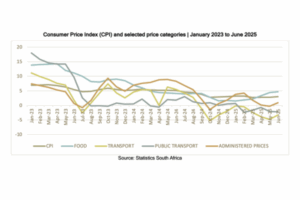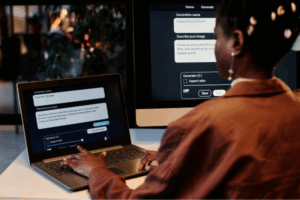About 4,000 doctors in Kenya’s public healthcare sector went on strike on March 14, 2024, demanding the implementation of a collective agreement signed with the government in 2017. The current government said they could not fulfil the deal due to financial constraints from the previous regime. Monicah Gachuki, the National Organiser for The Kenya Medical Practitioners, Pharmacists and Dentists Union (KMPDU), reflects on their 56-day strike that ended in May.
Please tell us about your role in the union?
In my role as a National Organising Officer for KMPDU, my primary responsibilities revolve around organisng and recruiting doctors, especially those in the private sector. This involves educating them on labour laws, fostering understanding of union benefits, and ensuring member retention within the union. Additionally, I play a key role in managing the union’s communication efforts, which includes overseeing our social media presence, crafting press releases, and coordinating events that engage our members. I am also actively involved in negotiating collective bargaining agreements to secure favourable terms for our members.
The KMPDU, which represents more than 7,000 members, went on strike on 13 March, with issues including delayed posting of medical interns, inadequate comprehensive coverage, and outstanding basic salary arrears among, other critical issues.
How did workers organise? How did you communicate?
The union’s structure involves the National Advisory Committee (NAC) as the primary decision-making body, which communicates strike intentions to all levels of leadership, including branches. We leverage various social media platforms like Facebook, Instagram, X (formerly Twitter), WhatsApp, and our union website to amplify our message effectively. WhatsApp groups serve as a valuable tool for immediate communication with all doctors, enabling swift outreach. AdAn organiser reflects on a 56-day strike by doctors in the public sector.ditionally, bulk messaging and email campaigns have proven highly effective.
Branch leaders play a crucial role in reaching out to branch members, mobilising support, and ensuring widespread participation in union activities. Their efforts are instrumental in uniting and empowering our membership at the grassroots level.
What was the initial response from the authorities?
The strike faced immediate and intense opposition from authorities. At the outset of the strike, the situation was exacerbated by a circular from the Salaries and Remuneration Commission (SRC) announcing a shocking 66% reduction in the salary of medical interns, which was a clear violation of the same CBA we were out defending. Simultaneously, the Kenya National Hospital (KNH) initiated legal action to halt the strike, reflecting a broader pattern of hostility towards the doctors’ legitimate grievances.
The strike has recently ended. Have demands been met to the union’s satisfaction?
Following the successful addressing of 18 out of the 19 demands, the Return to Work Formula was signed. However, negotiations are ongoing regarding the remaining issue of posting medical interns, awaiting a court ruling within the next 60 days. The primary point of contention in this matter is the payment rate for medical interns, with the union advocating for compensation according to the 2017 Collective Bargaining Agreement (CBA) at Ksh 206,000, while the government proposes payment based on the SRC circular dated 13th March 2024 at Ksh 70,000.
What lessons were learnt from the process?
One of the key lessons we derived from the strike was the critical importance of maintaining a strong and effective communication strategy. It became evident that we needed to enhance our efforts in keeping our message clear and alive throughout the strike period. There was a notable gap between our demands and the public’s understanding, with some misconceptions arising that we were solely seeking a pay raise rather than addressing substantive issues outlined in our strike notice.
Additionally, there was confusion surrounding the perceived higher pay of medical interns compared to interns in other fields, which required substantial clarification. We found ourselves continuously explaining the unique roles and responsibilities of medical interns and demystifying unfamiliar terms to garner broader public support and understanding. This experience highlighted the necessity of proactive and comprehensive communication to effectively convey the reasons and objectives behind our actions during the strike.
You took part in ILO/IFWEA training in 2022 – what did this entail?
The course was titled “Training of Trainers on E-Learning and Digital Communication in East Africa”. This course was designed to enhance the capabilities of trade union educators in East Africa, specifically focusing on delivering effective online courses that benefit trade union members. The training emphasised improving our skills and tools necessary for developing informative, accessible, and impactful online courses tailored to the needs of union members in the region. By enhancing our abilities in e-learning and digital communication, the course aimed to empower us to deliver quality educational content and drive positive changes within our trade unions.
How are you using this training in your organisation now?
I am now preparing to utilise the IFWEA website to conduct a course for our Secretariat, followed by training for our entire leadership and membership. This will allow us to effectively disseminate valuable knowledge and skills gained from the training across our union, contributing to our collective growth and effectiveness.
How did you get involved in KMPDU?
I recently joined the union last year in November when they were seeking someone to assist in organising doctors within the private sector. My background as an industrial relations officer at KUDHEIHA workers played a key role in securing this position, as my experience in industrial relations and organising workers was highly relevant and beneficial for the role within KMPDU.
This article is republished from International Federation of Workers’ Education Association (IFWEA). Read the original article.
Learn about online courses and study circles for workers on IFWEA’s Online Labour Academy.






